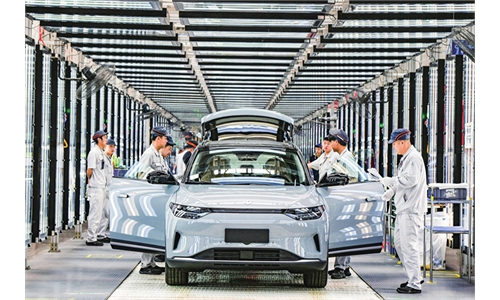Illustration: Liu Rui/GT
On May 14 local time, the Biden administration announced "severe" new tariffs on $18 billion worth of Chinese imports, including Chinese-made steel and aluminum, semiconductors, electric vehicles (EVs), lithium batteries and components, critical minerals, photovoltaic cells, port cranes, and personal protective equipment. Among these, tariffs on imported Chinese EVs will be quadrupled, rising from 25 percent to 100 percent. The import tax on Chinese solar cells will also double, from 25 percent to 50 percent. Additionally, starting from 2025, tariffs on imported Chinese semiconductors will jump from 25 percent to 50 percent.
In the context of the previous administration's Section 301 tariffs on China still being in place, the US side's use of the so-called "review" process to further increase or impose additional tariffs on Chinese products exported to the US is a serious provocation against China. This approach contradicts President Biden's commitment of not "holding back China's development" and not "seeking decoupling from China." It also goes against the important consensus reached by the leaders of the two countries. To some extent, it can even be understood as the US initiating a new round of tariff friction.
Before announcing the imposition of additional tariffs on China, the US repeatedly spread negative information in an attempt to smear related Chinese technology and products. This is essentially a sign of guilt, trying to manipulate public opinion to cover up the fact that they are politicizing and instrumentalizing economic and trade issues. It must be reiterated that the US has no legitimacy in imposing additional tariffs on China. The World Trade Organization (WTO) expert panel ruled that the Section 301 tariffs violate WTO rules. By continuing to impose additional tariffs on China based on Section 301, the US is further disregarding WTO authority and international trade rules, compounding its mistakes. Suppressing advanced industries of other countries under the banner of "overcapacity" and using "fair competition" as an excuse to promote protectionism are blatant bullying.
The US also uses the so-called "forced technology transfer" and "intellectual property theft" by China, along with the alleged "overcapacity," to justify imposing high tariffs on Chinese goods. These are fragile lies that can easily be exposed. In the fields of the products subjected to additional tariffs, Chinese technology is advanced and does not need to "compel" American companies to engage in "forced technology transfer," nor is there "intellectual property theft." The American political elites' accusations of "forced technology transfer" and "intellectual property theft" as the source of competitiveness for these Chinese products are like grabbing a script and speaking without matching the lines.
As for the accusation of "overcapacity," it is nothing but a lie fabricated by the US. Any product that the US lacks competitiveness in and is important to the US can be arbitrarily labeled as "overcapacity" by the US. In fact, the so-called "overcapacity" of some Chinese products is the result of the US' policy of trade protectionism and market distortion behavior. If the US opens its market, the overall supply and demand of these products in the international market will be more balanced, and the demand for new energy products in the US will also be met.
As mentioned in a previous editorial of the Global Times, considering the "almost zero" number of EVs exported from China to the US, even if the new tariffs are implemented, they are unlikely to immediately impact Chinese electric car companies. The same goes for lithium batteries and photovoltaic products. The Biden administration's exaggerated announcement at this time is of a practical but "not very useful" nature, giving the impression that it is not a careful choice made from genuine economic considerations, but rather a political show aimed at winning voters in an election year. It is a tariff package tailored to meet the political needs of the US. What is absurd is that after news about the White House's plan to impose a 100 percent tariff on Chinese electric vehicles began to circulate, Trump immediately stated that he would slap a 200 percent tariff. It is clear that tariffs on China are being used as a card, and all actions revolve around domestic political interests.
Furthermore, the US imposing high tariffs on personal protective equipment from China is particularly puzzling. During the COVID-19 pandemic, there was a global shortage of personal protective equipment, and China exported these products to the US, effectively helping the US fight the epidemic and protect the health of Americans. The US is now imposing high tariffs on these products, which has a strong sense of burning bridges after crossing them. It is precisely because of this that the US' imposition of tariffs on China this time is more repugnant and disgusting, fully exposing the hypocrisy of US hegemony.
China-US relations should not be used as a scapegoat for domestic US politics, and China will not stay silent in the face of unfounded accusations from anti-China forces. Despite some in the US hoping for China's "understanding," these tariffs greatly harm China's legitimate development rights and seek to limit the development space of related industries in China. China will definitely take resolute measures to defend its own interests. The US should not be arrogant or harbor any illusions.



